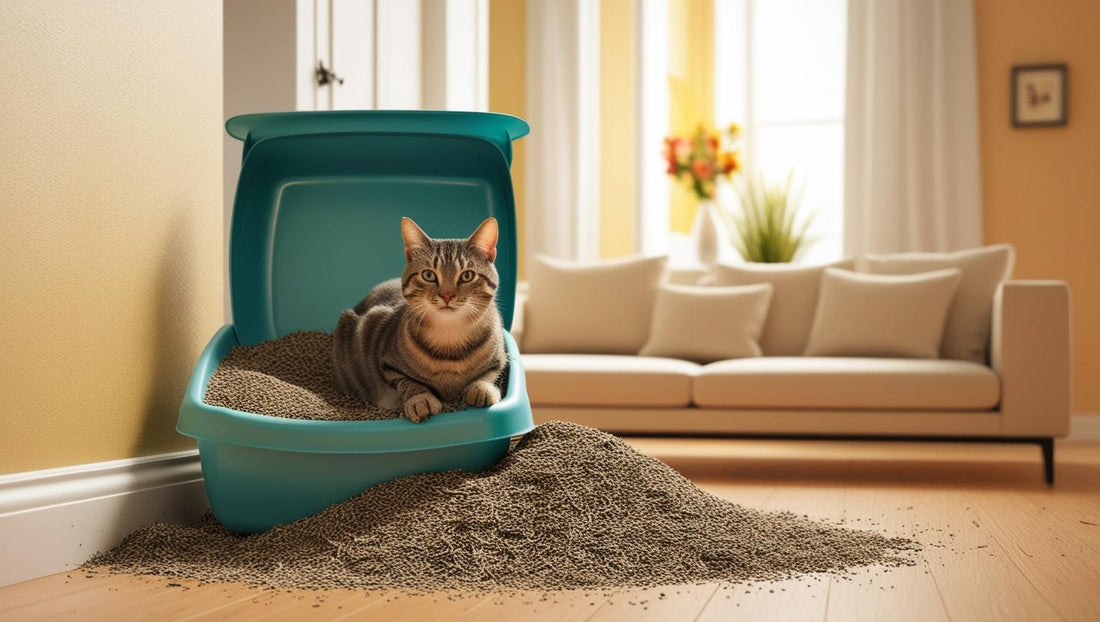
Why Does My Cat Play in the Litter Box (and What to Do)?
Share
We've all been there. You meticulously clean the litter box, perhaps even treating yourself to a fresh litter box liner for easy cleanup, and then… wham! Your cat dives in, not to relieve themselves, but to play. It's a scene that can leave cat owners scratching their heads (and maybe a little exasperated). Why does my cat play in the litter box? Is it normal? And more importantly, how can I gently redirect this behavior?
Let's delve into the fascinating world of feline behavior and uncover the reasons behind this common, yet sometimes perplexing, habit.

The Allure of the Litter Box: More Than Just a Bathroom
For us, the litter box is a purely functional object. But for our cats, it can be so much more. Think of it as their personal sandbox, a place where they can dig, bury, and explore. It's a sensory experience, engaging their natural instincts.
Instinctual Digging: Cats are natural diggers. They bury their waste to conceal their scent from predators (a behavior that dates back to their wild ancestors). This instinctual drive can manifest as playful digging in the litter, even if there's no "business" to attend to.
The Joy of Freshness: Have you ever noticed your cat seems particularly enthusiastic about the litter box after you clean it? This is a common phenomenon. A freshly cleaned litter box is like a blank canvas, inviting your cat to explore and leave their mark. It's like saying, "Ta-da! All clean for you!" and your cat responding with a joyful "Thank you, human!" in the form of a playful romp. This explains why many ask, "Why does my cat play in the litter box after I clean it?" It's the irresistible allure of a fresh, clean space.
Nighttime Fun: Cats are often more active at night. So, if you find your cat playing in the litter box primarily at night, it could simply be a case of nighttime zoomies. They might be asking, "Why does my cat play in the litter box at night?" The answer could simply be: because it's playtime!
Scent Marking: Cats are territorial creatures. They leave their scent in various places to mark their territory. The litter box, being a central location, is a prime spot for scent marking. Playful digging can be a way for your cat to redistribute their scent and reinforce their claim to the litter box.
When Play Becomes a Problem: Recognizing Red Flags
While occasional play in the litter box is usually harmless, it's essential to distinguish between normal play and potential health or behavioral issues.
Excessive Play: If your cat spends an excessive amount of time playing in the litter box, it could be a sign of boredom or anxiety. Ensure your cat has plenty of toys, scratching posts, and opportunities for interactive play.
Eating Litter: This is a serious concern, especially in kittens, who may experiment due to curiosity. However, eating litter can also be a sign of physical or mental illness. If you notice your cat eating litter, consult your veterinarian promptly.
Changes in Behavior: If your cat's play behavior suddenly changes, or if they start avoiding the litter box altogether, it's crucial to rule out any underlying medical conditions. Urinary tract infections, for example, can make urination painful, leading to litter box aversion.
Litter Box Aversion: Sometimes, a cat's playful interaction with the litter box can turn into aversion. This can be due to a negative experience, like a painful urination while in the box, or simply disliking the type of litter. If your cat starts avoiding the litter box, it's crucial to address the issue promptly.
Creating a Purr-fect Litter Box Environment
A well-maintained litter box can go a long way in preventing unwanted play and promoting healthy litter box habits.
Choosing the Right Litter Box: The wide variety of litter boxes available can be overwhelming. Keeping the litter box clean is essential, so an easy-to-clean option like a stainless steel litter box is a great choice if you’re tired of frequent scrubbing. The CattyKasa stainless steel litter box with an air purification device not only simplifies cleaning but also removes harmful odors and bacteria quickly, creating a healthier environment for both you and your pets.
Litter Box Maintenance: Regular cleaning is crucial. Scoop the litter box daily and change the litter frequently to prevent mold in litter box and keep your cat happy and healthy.
Redirecting Playful Paws: Gentle Guidance
If your cat's litter box play is becoming problematic, there are gentle ways to redirect their behavior.
Provide Alternative Play Opportunities: Engage your cat in interactive play sessions with toys, feather wands, or laser pointers. This will help satisfy their natural hunting instincts and reduce their urge to play in the litter box.
Enrichment: Provide your cat with plenty of environmental enrichment, such as scratching posts, cat trees, and puzzle feeders. A kitty condo litter box or a hidden plant litter box can add an element of fun and exploration.
Positive Reinforcement: Reward your cat for playing with their toys, not the litter box. Use positive reinforcement techniques, such as treats, praise, or petting.
Avoid Punishment: Never punish your cat for playing in the litter box. This will only create fear and anxiety, and may worsen the problem.
A Final Thought: Understanding Your Feline Friend
Ultimately, understanding your cat's individual personality and needs is key to addressing any behavioral issues. While litter box play can be frustrating, remember that your cat is not trying to be naughty. They are simply expressing their natural instincts. By providing a clean and comfortable litter box environment, along with plenty of enrichment and play opportunities, you can help your cat develop healthy litter box habits and enjoy a happy, fulfilling life. And who knows, maybe you'll even capture a cute "cat in litter box snow globe" moment!
